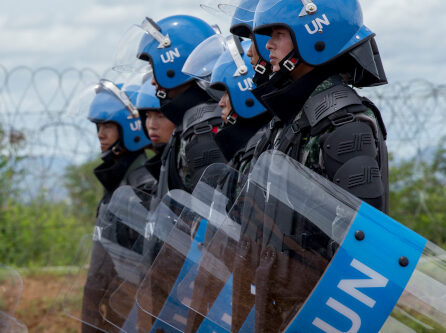Case File
Armor Holdings and the United Nations

Contents
Introduction
Introduction
contentsIn one of the rare cases where a payer of bribes went to prison, Richard Bistrong, a vice president for international sales at Armor Holdings (acquired by BAE Systems in 2007) admitted in 2010 to paying USD 200,000 to a UN official, via intermediaries, to win contracts for body armor, helmets, and other protective equipment with the United Nations. The company paid USD 16 million in fines in a settlement, and also admitted USD 4.4 million in undisclosed commission payments, made by Bistrong and others over a period of several years. Before the plea deal, Bistrong was used by federal authorities in a corruption sting operation which led to 22 arrests, but ultimately no convictions. He has since become an anti-corruption blogger and consultant.
Case Details
Case details
contentsActors
Actors
contentsRichard Bistrong – Armor Holdings Vice President for Sales, 1995-2007; convicted of bribery and sentenced to fourteen months in prison.
Unnamed UN procurement official – described as the bribe recipient in the prosecution of Bistrong.
Unnamed intermediary – described in the prosecution of Bistrong.
Allegations
Summary of Corruption Allegations
contentsThe specific acts of bribery admitted to by Bistrong involved two contracts with the UN for body armor and other protective gear in 2001 and 2003. Bistrong was at the time a vice president for international sales, primarily working with Armor Holdings’ Products Group division. Bistrong organized for commissions of USD 223,000 to be paid in 92 installments to a UN agent, who passed part of this on to a UN procurement official, who ensured that Armor Holdings won the contracts. The UN official allegedly provided insider information, including details of rival bids, allowing the agent to fill in prices on a signed, but otherwise blank, pricing sheet form Armor Holdings, so as to win the contracts. The bribery was conducted through Armor Holdings’ UK subsidiary, Armor Products International Ltd. (API). The relationship with the intermediary was covered by a sham consultancy contract. Bistrong also arranged bribes to a Dutch procurement official to win a 2003 contract for pepper spray by ensuring that the tender was written so that only Armor Holdings could fulfill it.
The UN contracts were worth a total of USD 7.1 million in revenue to Armor Holdings, and USD 1.55 million in net profits. Aside from the specific bribes identified with these contracts, Bistrong and others made USD 4.4 million of unspecified commission payments to a variety of intermediaries between 2001 and 2006 which were covered with false invoices in company accounts. While it may be reasonably suspected that many of these commission payments involved corruption, no specific corrupt deals have been associated with them.
Outcomes
Investigation Outcomes
contents- Bistrong and his co-conspirators’ activities were initially uncovered as the result of internal investigations and audits by Armor Holdings, in 2007. The company subsequently self-reported to the DOJ. Bistrong began cooperating with federal authorities in 2007 and participated in an elaborate FBI sting operation whereby he and others pretended to be agents seeking to negotiate corrupt arms deals with African countries. Twenty-two individuals were arrested and charged with corruption-related crimes as a result of the sting.
- The case resulted in a serious of mistrials and acquittals in 2011 and 2012 and all charges were subsequently dropped.
- Armor Holdings agreed a Non Prosecution Agreement with the DOJ in 2011, and settled a parallel civil case with the Securities and Exchange Commission (SEC). It paid fines totaling USD 16 million and agreed to maintain strong internal compliance standards. The law enforcement agencies agreed to an NPA because of the company’s self-reporting and the compliance measures it had subsequently taken, including firing Bistrong and other employees involved in the corrupt acts.
- Bistrong was sentenced to eighteen months in a federal prison in 2012, despite the prosecutors’ request that he be given a lenient sentence on account of his cooperation in the sting operation. He subsequently pursued a career as an anti-corruption blogger, speaker, and consultant, promoting and advising on compliance measures within companies. He talks of how bribery became normalized as a part of his role as an international sales executive. “‘My experience with foreign bribery started early on in my international career,” Bistrong told Corporate Crime Reporter. “I was nodding to conversations where third parties and intermediaries were sharing with me in very colorful and rich language — that involved many words other than the word bribe — that they were paying bribes.” “I moved from nodding to much more later. By the time I was called in by the Justice Department, I was thinking corruptly, I was behaving corruptly and I was acting corruptly.”
References
References
contentsImage Caption: UN peacekeepers in South Sudan conduct a riot control training exercise in May 2015.
Image Source: Flickr/Creative Commons, United Nations Photo.
“DOJ Criminal Information on Richard Bistrong,” United States Court for the District of Colombia, Jan. 21, 2010, https://www.justice.gov/sites/default/files/criminal-fraud/legacy/2013/05/07/01-21-10bistrong-information.pdf.
U.S. Securities and Exchange Commission, “SEC Charges Armor Holdings, Inc. With FCPA Violations in Connection With Sales to the United Nations,” July 13, 2011, https://www.sec.gov/news/press/2011/2011-146.htm.
“Richard Bistrong on FCPA compliance and what actually happens”, Corporate Crime Reporter, Nov. 4, 2015, https://www.corporatecrimereporter.com/news/200/richard-bistrong-on-the-fcpa-compliance-and-what-actually-happens/.
“Q&A with Richard Bistrong, the FCPA blogger who knows,” Conselium, Sep. 8, 2015, https://www.corporatecrimereporter.com/news/200/richard-bistrong-on-the-fcpa-compliance-and-what-actually-happens/.
Richard L. Cassin, “Mistrial! Gov’t Shoots Blanks In Shot-Show Case,” FCPA Blog, July 7, 2011, http://www.fcpablog.com/blog/2011/7/7/mistrial-govt-shoots-blanks-in-shot-show-case.html.
Richard Bistrong, “When corruption becomes normal,” FCPA Blog, June 30, 2015, http://www.fcpablog.com/blog/2015/6/30/richard-bistrong-when-corruption-becomes-normal.html.